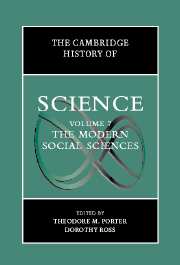Book contents
- Frontmatter
- 1 Introduction: Writing the History of Social Science
- PART I SCIENCES OF THE SOCIAL TO THE LATE NINETEENTH CENTURY
- 2 Genres and Objects of Social Inquiry, From the Enlightenment to 1890
- 3 Social Thought and Natural Science
- 4 Cause, Teleology, and Method
- 5 Utopian Socialism And Social Science
- 6 Social Surveys in the Eighteenth and Nineteenth Centuries
- 7 Scientific Ethnography and Travel, 1750–1850
- 8 History and Historicism
- 9 Bringing the Psyche into Scientific Focus
- 10 Continental Political Economy From the Physiocrats to the Marginal Revolution
- 11 British Economic Theory From Locke To Marshall
- 12 Marx and Marxism
- PART II THE DISCIPLINES IN WESTERN EUROPE AND NORTH AMERICA SINCE ABOUT 1880
- PART III THE INTERNATIONALIZATION OF THE SOCIAL SCIENCES
- PART IV SOCIAL SCIENCE AS DISCOURSE AND PRACTICE IN PUBLIC AND PRIVATE LIFE
- Index
- References
5 - Utopian Socialism And Social Science
from PART I - SCIENCES OF THE SOCIAL TO THE LATE NINETEENTH CENTURY
Published online by Cambridge University Press: 28 March 2008
- Frontmatter
- 1 Introduction: Writing the History of Social Science
- PART I SCIENCES OF THE SOCIAL TO THE LATE NINETEENTH CENTURY
- 2 Genres and Objects of Social Inquiry, From the Enlightenment to 1890
- 3 Social Thought and Natural Science
- 4 Cause, Teleology, and Method
- 5 Utopian Socialism And Social Science
- 6 Social Surveys in the Eighteenth and Nineteenth Centuries
- 7 Scientific Ethnography and Travel, 1750–1850
- 8 History and Historicism
- 9 Bringing the Psyche into Scientific Focus
- 10 Continental Political Economy From the Physiocrats to the Marginal Revolution
- 11 British Economic Theory From Locke To Marshall
- 12 Marx and Marxism
- PART II THE DISCIPLINES IN WESTERN EUROPE AND NORTH AMERICA SINCE ABOUT 1880
- PART III THE INTERNATIONALIZATION OF THE SOCIAL SCIENCES
- PART IV SOCIAL SCIENCE AS DISCOURSE AND PRACTICE IN PUBLIC AND PRIVATE LIFE
- Index
- References
Summary
During the nineteenth century, utopian socialism was most often interpreted as an essentially political phenomenon. Few commentators took seriously its ambition to create a new science of man and society. Yet the invention of such a science was one of the fundamental claims of Saint-Simon, Fourier, Owen, and their disciples who saw a scientific understanding of society as a prerequisite for its reconstruction.
At the turn of the century, Émile Durkheim was among the first to stress the role of utopian socialism in the emergence of the social sciences. He considered Saint-Simon, the mentor of Auguste Comte, to be the true founder of sociology. Since the time of Durkheim, the importance of utopian socialism in the birth of the social sciences has been widely recognized. This role is, however, difficult to assess accurately. Utopian socialism was, after all, the inheritor of eighteenth-century reflections regarding man and society. These reflections were in turn indebted to a long tradition of utopian writings dealing with social organization, beginning with Thomas More’s Utopia, published in 1516. To what extent did Saint-Simon, Fourier, and Owen break with the Enlightenment and its utopian component to mark a new era in social thought?
Another justification for a more thorough inquiry lies in the definition of the social sciences given by the utopian socialists. Although meant to be a departure from the philosophical tradition, their idea of science was still imbued with philosophical and even metaphysical conceptions. Extending far beyond the limits of our contemporary social sciences, Saint-Simon’s, Fourier’s, and Owen’s doctrines appear in retrospect as a disconcerting combination of brilliant intuition and oversimplification, of original thought and prejudice.
- Type
- Chapter
- Information
- The Cambridge History of Science , pp. 71 - 82Publisher: Cambridge University PressPrint publication year: 2003
References
- 8
- Cited by

